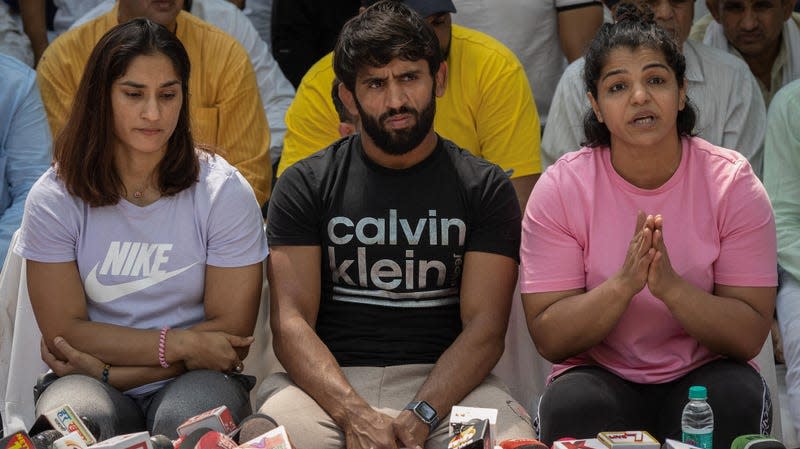India's response to wrestlers protesting sexual misconduct was forceful removal and detention

Indian wrestling’s #MeToo movement is about to enter its sixth month of protest and shows no signs of wavering in its resolve to seek justice.
At the start of this year, top athletes accused Wrestling Federation of India (WFI) president Brij Bhushan Sharan Singh and other coaches of sexual misconduct spanning several years. Three months after the first uproar—and inaction—they started a sit-in protest.
Read more
On Sunday (May 28), the athletes were dragged and detained, and their tents cleared. But the world is watching. International authority, the United World Wrestling, condemned the mistreatment of athletes, and even threatened the WFI with suspension over further mismanagement. This week, the athletes considered dropping their Olympic medals in the Ganga river and starting a hunger strike, but decided to wait to take further action to give the government five days to act against Singh.
Athletes in India and beyond, including Tokyo Olympics gold medalist and three-time world champion wrestler Risako Kawai of Japan, have expressed support for their colleagues’ plight. But Indian authorities have been moving at snail’s pace. India’s sports ministry launched an investigation into the allegations, but its findings weren’t disclosed to the public. It was only in mid-May that any complaint against Singh, who has been WFI president since 2011, and who is also a lawmaker for the ruling Bharatiya Janata Party (BJP), was taken seriously by the Delhi police.
Quotable: The international governing body for wrestling send a stern message
“UWW firmly condemns the treatment and detention of the wrestlers. It expresses its disappointment over the lack of results of the investigations so far. UWW urges the relevant authorities to conduct a thorough and impartial investigation into the allegations.” —United World Wrestling in a May 30 statement
An extensive timeline of the Indian wrestlers’ protest
Jan 18: The wrestlers mount a protest at Jantar Mantar in Delhi, levelling accusations against the WFI chief and other coaches. India’s sports ministry gave WFI 72 hours to respond to the accusations, or otherwise face action.
Jan 19-20: Wrestlers meet sports minister Anurag Thakur, but reach no solution even after a five-hour meeting. Wrestlers continue their protest, complaining to the Indian Olympic Association (IOA) president PT Usha, who forms a seven-member panel under 2012 Olympic medallist MC Mary Kom to inquire into the allegations. WFI rejects all allegations.
Jan 21: Wrestlers call off the protest and wait on the sports ministry to form an Oversight Committee and probe the allegations. Singh steps aside as investigations start and WFI is instructed to suspend all ongoing activities with immediate effect. The ministry also suspended assistant secretary of WFI, Vinod Tomar. (Tomar’s number is still on the WFI website, but it is not reachable.)
Jan 23: The Oversight Committee (OC) is given four weeks to complete a probe.
Feb 23: The United World Wrestling moves the Asian Wrestling Championships, which were to be held in New Delhi this March, to Astana, Kazakhstan, in mid-April citing the ongoing inquiry against the WFI. The same day, the sports ministry oversight committee’s tenure is extended by two weeks.
April 16: Singh says he won’t contest for the WFI president’s post in the upcoming elections the following month, but he doesn’t rule out running for any other role. He wasn’t eligible for the top post anyway after holding it for three consecutive four year terms—the threshold after which a four-year cooling off period is needed.
April 23: Wrestlers resume their protests with a sit-in at Jantar Mantar after the police fails to launch an investigation following their complaint.
Aprl 27: The IOA forms a three-member ad-hoc committee to handle the day-to-day affairs of the WFI and conduct its elections within the next 45 days.
April 28: Delhi police is forced to file two first information reports (FIRs)–the first step to opening an investigation—against Singh. One pertains to allegations leveled by a minor, registered under the Protection of Children from Sexual Offences (POCSO) Act, and the second FIR addresses report tendered by adult complainants.
May 8: Members of several farmer unions and khap panchayats (village councils) join the wrestlers in calling for Singh’s arrest.
May 12: The National Human Rights Commission issued notices to the sports ministry, the WFI, the Sports Authority of India, and many other sports bodies for failing to adhere to the requirements of the 2013 Prevention of Sexual Harassment (POSH) Act.
May 31: Delhi police bulks up security at the site wrestlers picked for their possible hunger strike.
People of interest: The star athletes who’re the face of the protest
Vinesh Phogat: The first Indian woman wrestler to win gold in both Commonwealth and Asian Games. She’s part of India’s famed Phogat sisters, whose story inspired Aamir Khan’s film Dangal—the highest-grossing Indian film of all time.
Sakshi Malik: The first woman wrestler from India to win an Olympic medal, Malik won a bronze in the 58kg women’s wrestling event during the 2016 Rio De Janeiro games.
Bajrang Punia: The freestyle wrestler won bronze in the men’s 65-kg weight category at the 2020 Tokyo Olympics.
Related stories
🤼 Indian wrestling is having its MeToo moment, but will it last?
🕴 India’s #MeToo wave is already forcing powerful men out of their jobs
🗣 A year on, #MeToo has lost momentum in India but we must keep the conversation going
More from Quartz
Sign up for Quartz's Newsletter. For the latest news, Facebook, Twitter and Instagram.
